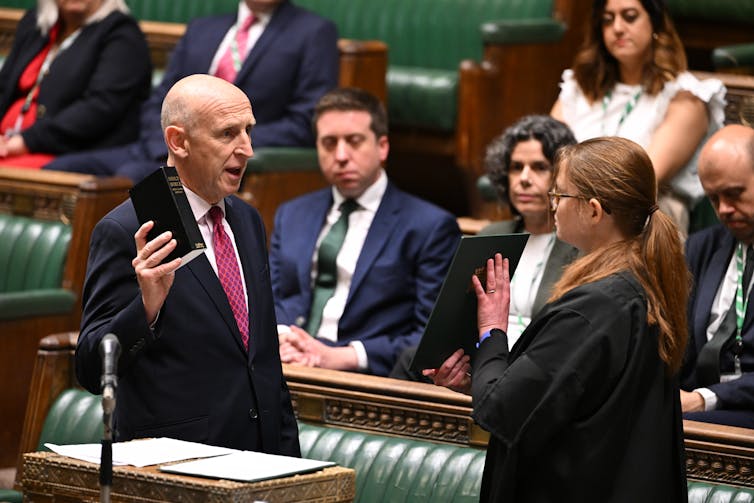Assisted dying bill: religious MPs were more likely to oppose law change in first round of voting
MPs are due to vote for a second time on the terminally ill adults (end of life) bill in parliament – a law that would legalise assisted suicide in England and Wales.
The third reading stage will take place after a debate on Friday May 16 and would test MPs’ commitment to a change they initially supported at second reading in November 2024. In this first vote, the bill passed with 331 votes to 276 (with 35 abstentions), but in subsequent stages, the process has been more controversial. Emotions are running high and pressure groups have been vocal on both sides.
As with many issues of morality, this is a free vote – MPs are not told what to do by their party. And after the second reading in November, MPs could, and did, give a range of reasons for how they voted, including their own experiences of loved ones’ final days, discussions with constituents, the experiences of other countries with assisted suicide – and also their religious views.
Want more politics coverage from academic experts? Every week, we bring you informed analysis of developments in government and fact check the claims being made.
Sign up for our weekly politics newsletter, delivered every Friday.
In that first vote, there were clear patterns in voting relating to religious affiliation. MPs with no religion were much more likely to support assisted dying.
In this group, 76% voted for, while just 18% voted against. Christian MPs overall were more likely to oppose the bill, with 57% voting against with the most pronounced opposition coming from Catholics, who were 74% opposed.
Muslim MPs were even more likely to vote against, with 84% of them on the no side. Jewish and Sikh MPs were both roughly twice as likely to support the bill as to oppose it, whereas Hindu MPs were more likely to oppose than support by the same margin. The one Buddhist MP – Suella Braverman – voted against.
Beyond their own demographic, political or religious position, the views of their constituents are also expected to influence how MPs vote. To explore this, I conducted a regression analysis (a statistical method to find a relationship between factors) that included a range of constituency variables, such as the proportion of white residents and the percentage of each religious group (along with those identifying as non-religious).
I also considered the percentage of constituents with no formal qualifications, graduates, and those reporting some form of disability. In the full model, which incorporated all these variables, none of the religious variables were found to be statistically significant, suggesting that localised religious lobbying did not have a measurable effect on MPs’ voting behaviour.
However, an interesting finding is that MPs with a higher proportion of disabled people in their constituency were more likely to vote for assisted dying. It is not clear if this relationship is causal, suggesting they had been lobbied by their constituents to support the bill, or a correlation between disabled people being more likely to live in Labour constituencies.
How MPs voted on assisted dying, November 2024
Characteristic
Overall
Yes
No
Abstain
Total
642
331 (52%)
276 (43%)
35 (5%)
Female
261
143 (55%)
107 (41%)
11 (4.2%)
Ethnic MP
90
30 (33%)
57 (63%)
3 (3.3%)
LGBT
71
49 (69%)
18 (25%)
4 (5.6%)
Elected As
Labour
411
236 (57%)
155 (38%)
20 (4.9%)
Conservative
121
23 (19%)
93 (77%)
5 (4.1%)
Liberal Democrat
72
61 (85%)
11 (15%)
0 (0%)
Scottish National Party
9
0 (0%)
0 (0%)
9 (100%)
Independent
6
0 (0%)
6 (100%)
0 (0%)
Democratic Unionist Party
5
0 (0%)
5 (100%)
0 (0%)
Reform UK
5
3 (60%)
2 (40%)
0 (0%)
Green Party
4
4 (100%)
0 (0%)
0 (0%)
Plaid Cymru
4
3 (75%)
1 (25%)
0 (0%)
Social Democratic & Labour Party
2
1 (50%)
0 (0%)
1 (50%)
Alliance
1
0 (0%)
1 (100%)
0 (0%)
Traditional Unionist Voice
1
0 (0%)
1 (100%)
0 (0%)
Ulster Unionist Party
1
0 (0%)
1 (100%)
0 (0%)
MP Religion
None
234
179 (76%)
43 (18%)
12 (5.1%)
Christian (all)
351
132 (38%)
199 (57%)
20 (5.7%)
Catholic
35
7 (20%)
26 (74%)
2 (5.7%)
Muslim
25
2 (8.0%)
21 (84%)
2 (8.0%)
Jewish
13
8 (62%)
4 (31%)
1 (7.7%)
Sikh
12
8 (67%)
4 (33%)
0 (0%)
Hindu
6
2 (33%)
4 (67%)
0 (0%)
Buddhist
1
0 (0%)
1 (100%)
0 (0%)
Note: the vote tallies differ from that given by the parliament website because I have included tellers for both sides, and correctly assigned MPs who voted in both lobbies as abstentions.
In the first vote, female MPs were slightly more likely to vote for assisted dying than against it. LGBT MPs leaned heavily towards support (with 69% voting in favour of the law change). And minority ethnic MPs leaned heavily in the opposite directions – with 63% voting against.
Perhaps predictably, given the prime minister’s open support for assisted dying, Labour MPs supported the bill, with 57% voting in favour and 38% against.
The Liberal Democrats were overwhelmingly supportive – 85% backed it – whereas 77% of Conservative MPs voted against. All Northern Irish unionist parties – as well as the independent unionist MP – voted against the bill, with no abstentions.
Reform UK MPs were split, with two against and three in favour (albeit one of the three, the now-suspended Rupert Lowe, only after a survey of his own constituents).
But there is an interesting story unfolding on the left of politics. The 2024 general election saw challenges to Labour from both the Green Party and so-called Gaza independents. In this free vote, we see the contrasting social views between these two groups play out.
All Green MPs supported assisted dying, while all Gaza independents – and Jeremy Corbyn – opposed it. This divide echoes Maria Sobolewska and Robert Ford’s framework in Brexitland, which distinguishes between “conviction identity liberals” and “ethnic minority ‘necessity liberals’”.
The latter group aligns with conviction liberals on issues of discrimination due to self-interest, but often diverges on broader socially liberal issues such as assisted dying. Issues like assisted dying lay bare the tensions within this coalition.
Identifying religion in parliament
Religion is a personal matter so there is no official database that records the religious affiliation of MPs. It is therefore often impossible to test how religious views interact with voting behaviour. To address this gap, I built a dataset using a three-step methodology to determine MPs’ religious affiliation.
Among MPs (excluding the Speaker and Sinn Fein MPs, who don’t take their seats), 54.7% (351) are Christian, including 5.5% (35) who are Catholic; 36.4% (234) have no religion; 3.9% (25) are Muslim; 2% (13) are Jewish; 1.9% (12) are Sikh; 0.9% (6) are Hindu; and 0.2% (1) is Buddhist.
To work this out, I look first to see if an MP is a member of a religiously based group, such as Christians in Parliament. They are classified as belonging to that religion. Second, if an MP has publicly stated their religious beliefs – say, in a speech or interview – they are also classified accordingly.
Labour MP John Healey is sworn in with a bible.
Flickr/UK Parliament, CC BY-NC-ND
These first two steps, however, cover only a fraction of MPs. Fortunately, all MPs are required to take an oath of allegiance to the Crown when sworn in. This oath can be made on a religious text or as a non-religious affirmation, and crucially MPs can choose which text to swear on, making this decision a meaningful and publicly visible indication of belief.
That brings us to step three: the religious text (or lack thereof) used in the swearing-in ceremony is taken as an additional source of evidence for classification.
These three sources are used in order of priority. For example, Tim Farron is a member of Christians in Parliament and has spoken openly about his faith, yet he chose to affirm without using a religious text. Even so, he is classified as Christian based on the first two criteria.
What has been particularly interesting in this case has been the different voting patterns between Christian groups. I was able to set these groups apart because when MPs swear in, Catholics usually request specific versions of the Bible – such as the New Jerusalem Bible – whereas others might simply ask for “the Bible” and are given the King James Version.
Treating Catholics as a distinct category allows for greater nuance in the analysis of the religious composition of parliament. A full breakdown of the religion of MPs, and the data used for this project, can be found here.
We’ll soon be able to see how these markers interact with voting in the third reading.
David Jeffery does not work for, consult, own shares in or receive funding from any company or organisation that would benefit from this article, and has disclosed no relevant affiliations beyond their academic appointment.




